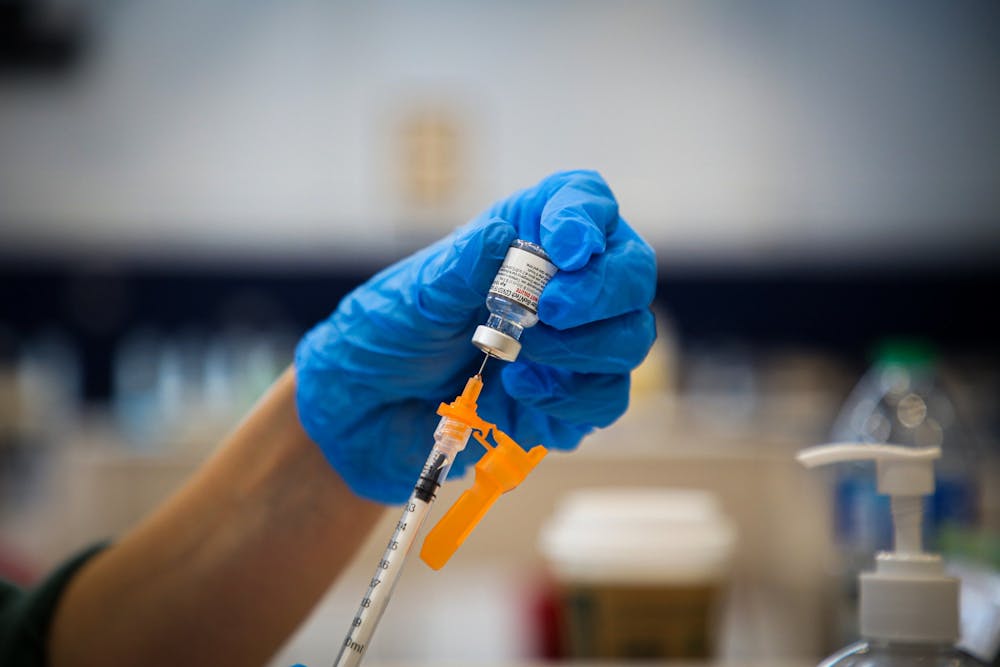
Beginning the spring semester with a two-week virtual learning period due to the Omicron variant and double-masking requirements, Penn resumed in-person instruction, albeit under several strict pandemic precautions.
After the University dropped its indoor mask mandate in March, cases and positivity rates skyrocketed and isolation housing began to overflow, forcing Penn to bring back the masking restriction during April’s outbreak.
In the fall, Penn returned to in-person learning and social events, nearly mirroring pre-pandemic campus life without restriction and hosting a bivalent booster clinic. The University’s rollercoaster saga of COVID-19 most recently featured a class action lawsuit settlement of $4.5 million.
Jan. 7 — The University announced in an email to the Penn community that spring move-in would require a pre-arrival COVID-19 test, a gateway test taken through the Penn Cares testing program, and double masking.
Spring semester courses began remotely on Jan. 12 and were set to transition to an in-person format on Jan. 24, with the exception of Nursing School clinical courses, which were able to be held-in person.
Jan. 14 — Wellness at Penn kicked off its second COVID-19 booster shot clinic. The clinic came before a University-imposed Jan. 31 deadline for all eligible community members to receive their booster shot.
Feb. 15 — Following a spike in cases at the end of January, where during one week, the undergraduate COVID-19 case count nearly tripled, infections fell to a semester low in mid-February. The sharp decrease in case count and positivity rate enabled the University to resume indoor social gatherings and event registration.
March 1 — Philadelphia public health officials lifted the city’s indoor mask mandate for most indoor settings, following a move to its lowest precautions tier, “All Clear.”
March 15 — Penn announced it would drop its indoor mask mandate for all non-classroom indoor spaces, effective immediately, in response to the City of Philadelphia’s move to the “All Clear” precautions tier. Masks would be removed in classrooms two weeks later on March 28.
March 24 — Penn paused its plan to lift its classroom mask mandate, citing consultations with “student and faculty stakeholders on campus.”
April 12 — Philadelphia reinstated its indoor mask mandate following a rise in cases, triggering a shift from the city’s “All Clear” precautions tier to the “Mask Precautions" tier. The change made Philadelphia the first major city in the country to bring back a citywide mask mandate.
April 13 — Penn announced that students who test positive for COVID-19 would be instructed to isolate in place, as the University isolation housing approached capacity following a spike after Spring Fling. The Mason on Chestnut Apartments and Axis Apartments were being used as isolation spaces.
April 16 — Penn’s COVID-19 case count reached a 13-week high, with 801 community members testing positive.
April 18 — In accordance with revised guidance from the City of Philadelphia, Penn similarly reimposed its indoor mask mandate.
April 22 — Just days later, the University once again dropped its indoor mask mandate for non-classroom indoor spaces.
May 23 — Following two years of operation, COVID-19 testing centers at Houston Hall and Du Bois ceased operations. University testing was downsized to one new Penn Cares site located at 3734 Spruce St.
Aug. 1 — Penn announced that professors would be able to choose whether to require students to wear masks in their classrooms for the fall semester. The University also announced a suspension of the PennOpen Pass symptom checker system for community members.
Aug 22. — The fall semester began with minimal COVID-19 mitigation measures in place for the first time in three years, with no requirements for mandatory testing or universal classroom masking.
Nov. 3 — The University began a two-day bivalent COVID-19 booster clinic at which Penn vaccinated over 4,000 community members.
At the same time, former Penn students and the University announced a proposed settlement of $4.5 million in a class action lawsuit against Penn. The students sought a refund for the switch to remote learning during the spring 2020 semester.
Check out the rest of the DP’s Year in Review content here.
The Daily Pennsylvanian is an independent, student-run newspaper. Please consider making a donation to support the coverage that shapes the University. Your generosity ensures a future of strong journalism at Penn.
Donate







